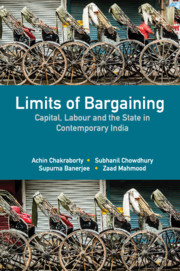Book contents
- Frontmatter
- Contents
- List of Tables
- List of Figures
- Preface
- 1 Contextualising Trade Unions and Collective Bargaining
- 2 Collective Bargaining in India: An Overview
- 3 Everyday Processes of Collective Bargaining in West Bengal
- 4 Industrial Stagnation due to ‘Labour Militancy’? A Critical Look at the Macro Evidence
- 5 Trade Unions and Working-Class Politics in Contemporary West Bengal
- 6 The State and Collective Bargaining
- 7 Conclusion
- References
- Index
6 - The State and Collective Bargaining
Published online by Cambridge University Press: 05 June 2019
- Frontmatter
- Contents
- List of Tables
- List of Figures
- Preface
- 1 Contextualising Trade Unions and Collective Bargaining
- 2 Collective Bargaining in India: An Overview
- 3 Everyday Processes of Collective Bargaining in West Bengal
- 4 Industrial Stagnation due to ‘Labour Militancy’? A Critical Look at the Macro Evidence
- 5 Trade Unions and Working-Class Politics in Contemporary West Bengal
- 6 The State and Collective Bargaining
- 7 Conclusion
- References
- Index
Summary
In the previous chapters, we have enumerated the factors that have influenced the bargaining between labour and capital in West Bengal (WB). It has been underlined that economic conditions along with the role of trade unions and the state through their interactions determine the nature and outcome of bargaining. While Chapter 3 provided our observations from the field with regard to collective bargaining in WB, Chapters 4 and 5 enumerated the economic conditions and the role of trade unions and working class politics, respectively. In this chapter, we look at the role of the state in collective bargaining.
The state has an intrinsic role in capital–labour bargaining because of its historic claim to legitimacy enabling it to play the mediating role in the relationship between social groups to facilitate common development and welfare. In the production system this intervention between capital and labour is institutionalised through the Industrial Relations (IR) system. The tension and fluidity in capital–labour relation in a capitalist system arises primarily from three distinct but interrelated factors: indeterminacy of labour contract (since the performance of labour cannot be perfectly observed and therefore monitored); inequality between labour and capital; and the dynamic nature of workplace with coexistence of conflict and cooperation (Colling and Terry 2010). Since such contestations and inequality of power and wealth between labour and capital exist, the need for an institution that is relatively autonomous to the dynamics between labour and capital arises in order to provide a stable IR framework. Industrial Relations as the institutional framework of capital–labour affiliation manage such relations according to political–economic dynamics.
The role of the state has varied across countries and time depending on the dynamics of the state–market relationship. Many states, such as Germany, Sweden and India, have had significant involvement in collective bargaining, while countries such as the UK and the US have been marked by minor and non-decisive role in IR. In all countries, however, the state has a role in IR through legal enactments and institutions that establish the context and standard of IR (Streeck and Thelen 2005).
- Type
- Chapter
- Information
- Limits of BargainingCapital, Labour and the State in Contemporary India, pp. 104 - 128Publisher: Cambridge University PressPrint publication year: 2019



